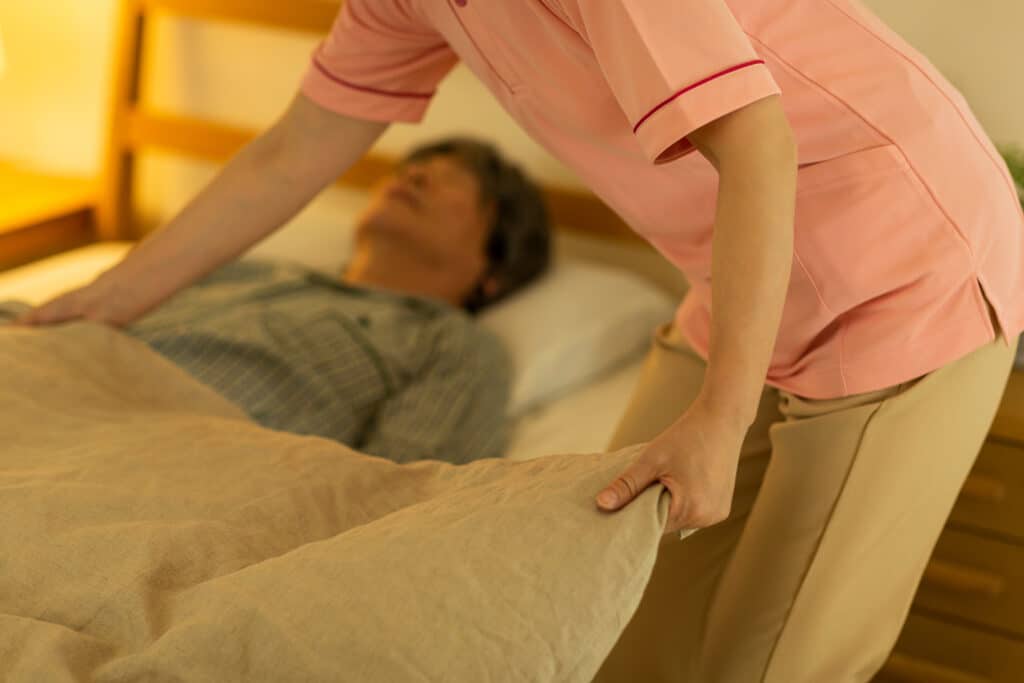If you have a senior parent that wants to stay at home as they get older home care is often a great way to make sure they are safe at home. But as your senior parent ages and their health needs change, they may need 24-hour home care instead of just daily care.
24-hour home care gives seniors and their families the peace of mind of knowing that the senior is never alone. It can also reduce falls, prevent loneliness, and help seniors manage anxiety and depression. If you notice that your senior parent that is aging at home is showing any of these signs, you should talk to them about overnight care or 24-hour home care.
Table of Contents
ToggleFrequent Falls or Balance Issues
If a senior has a history of falls or struggles with balance, it’s crucial to consider overnight care. Falls can lead to serious injuries, and having someone present during the night can provide assistance if needed.
Cognitive Impairment
Conditions like Alzheimer’s or dementia can lead to confusion and disorientation, especially at night. Seniors with cognitive impairment may wander or experience nighttime agitation, making overnight supervision necessary.
Medication Mishaps
Some seniors require medications at specific times, including during the night. Overnight caregivers can ensure that medications are taken as prescribed and monitor for any adverse reactions. If your senior parent is forgetting their medication, mixing up their medications, or just not taking them at night overnight care can ensure that they are getting their medications at the right times and taking them.
Incontinence
Seniors experiencing incontinence may need assistance with nighttime bathroom trips or changing bed linens. Overnight caregivers can help maintain cleanliness and comfort.
Sleep Disturbances
Seniors with sleep disorders, such as sleep apnea or insomnia, may require assistance with using CPAP machines or managing their sleep routines. Overnight care can help ensure they get the rest they need.
Confusion or Disorientation
Seniors who become disoriented or confused during the night may inadvertently put themselves in unsafe situations. Overnight caregivers can provide reassurance and guidance.
Trouble Getting Around
If a senior has mobility limitations, they may struggle with moving around at night, getting in and out of bed, or reaching necessary items. Overnight caregivers can assist with these tasks.
Increased Vulnerability to Health Emergencies
Some seniors have chronic health conditions that make them more vulnerable to emergencies, such as heart attacks or strokes. Overnight caregivers can provide immediate assistance and facilitate a faster response to emergencies.
Loneliness and Anxiety
Seniors who experience feelings of loneliness or anxiety during the night may benefit from companionship and emotional support. Overnight caregivers can provide reassurance and engage in conversation to alleviate these feelings.
Wandering Tendencies
Some seniors have a tendency to wander during the night, which can pose safety risks. Overnight care can include monitoring and redirection to ensure the senior stays in a safe environment.
Reduced Mobility Due to Recent Surgery or Injury
After surgery or injury, seniors may have limited mobility, making it difficult for them to move around, attend to their basic needs, or get up in the middle of the night. Overnight care can assist with these challenges.
Not Eating Or Drinking Enough
Seniors who require specific dietary or hydration needs, especially at specific times during the night, can benefit from overnight care that ensures proper nutrition and hydration.
Unpredictable Health Conditions
For seniors with unpredictable health conditions, overnight care can provide peace of mind. Caregivers can respond to emergencies and rapidly changing health situations.
Providing exceptional 24-Hour Home Care for seniors and families in the Northern Virginia area, including Arlington, Alexandria, McLean, Reston, Burke, Ashburn, Centreville, Springfield, Manassas, and Oakton. Call today to speak with our caring staff: (703) 272-8838.
- Training of the Month: Lymphedema - May 15, 2025
- Career and Opportunities Fair - May 15, 2025
- Vienna Wellness and Safety Expo - May 15, 2025




